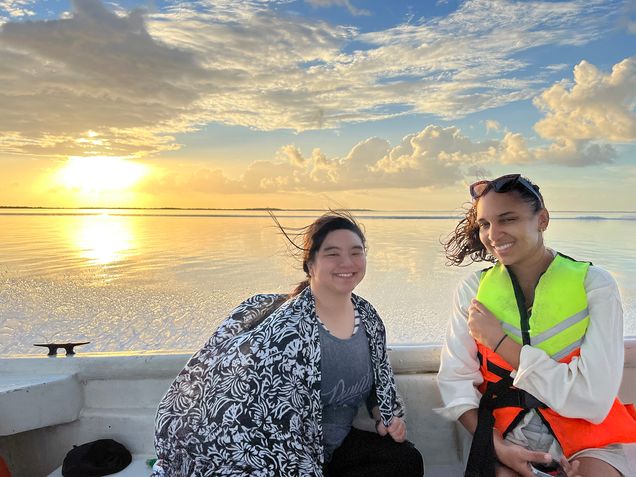BU Biology Alum, Professor Michael Dustin, has been awarded a prestigious fellowship from The Royal Society
The Royal Society has awarded a prestigious fellowship to Professor Michael Dustin, who holds the Kennedy professorship at Oxford University. This recognition is in acknowledgment of his significant contributions to immunology research. Professor Dustin's groundbreaking work revolves around the concept of the immunological synapse, which elucidates how T lymphocytes identify and respond to target cells. He played a pioneering role in utilizing fluorescently labeled native molecules from antigen-presenting cells in supported planar bilayers to determine the molecules and pathways involved in T cell activation following antigen recognition. Additionally, he is renowned for being one of the first researchers to develop imaging techniques that visualize the dynamic nature of immune responses within tissues. His work has laid a crucial foundation for the advancement of therapies targeting T cell responses, particularly in the realms of vaccines and immune-oncology.
Expressing his gratitude for the recognition, Professor Dustin stated, "Becoming a fellow of the Royal Society is an immense honor. I never anticipated such a remarkable privilege and opportunity, and I am deeply appreciative. I eagerly look forward to contributing to the Royal Society's objectives in any way I can."
Professor Dame Fiona Powrie, the Director of the Kennedy Institute, commented on the recognition, saying, "The Royal Society's well-deserved acknowledgment of Mike's pioneering research underscores the invaluable knowledge he has imparted regarding T cell activation, ultimately informing immune therapy approaches for cancer and autoimmune diseases."
Congratulations Michael!
The Garcia-Marcos lab publishes discovery in Proceeding of the National Academy of Sciences (PNAS)
The Garcia-Marcos lab, in collaboration with members of the Department of Chemistry at Boston University and the CSIC-CIB in Spain, have published in Proceeding of the National Academy of Sciences (PNAS) the discovery of a chemical compound that specifically blocks an aberrant mechanism of signaling in cancer cells that drives invasion and metastasis. The publication can be found here: https://www.pnas.org/doi/10.1073/pnas.2213140120
Human diseases frequently arise from defects in the mechanisms by which external cues are sensed and relayed to the interior of the cell. The proteins most widely targeted by existing therapeutic agents belong to a large family of cell surface receptors named G-protein-coupled receptors (GPCRs), which relay external cues by activating G-proteins in the interior of cells. Here, we report the surprising discovery of a synthetic small molecule that selectively targets G-proteins without compromising their ability to relay signals from GPCRs. Instead, this small molecule disrupts an atypical, GPCR-independent mechanism of G-protein signaling involved in cancer. This work reveals an alternative paradigm in targeting components of a signaling machinery with broad relevance in cellular communication in health and disease.
Joanna Lee Receives the 2023 Outstanding Teaching Fellow in Biology Award
Congratulations to Joanna Lee for receiving the Outstanding Teaching Fellow in Biology Award!
Joanna Lee is recognized for her teaching excellence when teaching Tropical Marine Invertebrates (CAS BI 569) and Marine Genomics (CAS BI 550) this year with her PI, Dr. John Finnerty. In these classes she helped guide the students through the research process and was responsible for preparing their equipment and materials.

“My favorite thing about being a teaching fellow is that I am in a position where I can help students without them feeling judgement. I'm also incredibly thankful for the wonderful students I've worked with; they are teaching me as much as I am teaching them.”
Alex Lion Receives 2023 Charles Terner Award
Congratulations to Alexandra Lion for receiving the Charles Terner Award.
This award supports CM or MCBB Ph.D. candidates who have completed the qualifying exam and made significant contributions to their field. Alexandra is a fifth-year MCBB Ph.D. student conducting research in the Bradham Lab. Her lab studies pattern formation during embryonic development using sea urchin larvae, Lytechinus variegatus as a model. Her project examines the effects of per-and polyfluorinated substances (PFAS) on skeletal patterning. In particular, perfluorooctanoic acid (PFOA) and the more recent, reportedly safer chemical hexafluoropropylene oxide dimer acid (GenX).

Congratulations, Alexandra!
Mandy Pinheiro Receives the Summer 2022 I. Alden Macchi and Susan K. Jackson Graduate Award
Congratulations to Mandy Pinheiro for receiving the I. Alden Macchi and Susan K. Jackson Graduate Award!
The Alden Macchi Award supports attending a conference for candidates who have completed the qualifying exam in endocrinology and regulatory biology.
The Susan K. Jackson Award recognizes students who create and nurture community in the College of Arts & Sciences at Boston University. Mandy was selected for this award for her efforts to build community in the Department of Biology and the broader Arts & Sciences community through her participation in GWISE as a student advisor and her engagement with events that support the professional development and mentorship of Bio graduate students. She has been a valued mentor to undergraduate students, guiding them through challenging times during the pandemic by creating a supportive and engaging learning environment.

Congratulations, Mandy!
Graduate Students Awarded Warren-McLeod Fellowships
Congratulations to the 2023 winners of the Warren-McLeod Awards!
Recipients of the summer Warren-McLeod Fellowships:
Morgan Bennett-Smith – Biology Ph.D. student in the Buston Lab
Lucila Bloemendaal – Earth & Environment Ph.D. student in the FitzGerald Lab
JK Da-Anoy – Biology Ph.D. student in the Davies Lab
Joshua Harringmeyer – Earth & Environment Ph.D. student in the Fichot Lab
Recipient of the annual Warren-McLeod Fellowship:
Nia Bartolucci – Earth & Environment Ph.D. student in the Fulweiler Lab
Nia is a 4th year Ph.D. candidate in the Fulweiler lab. She is a coastal biogeochemist studying how climate change and other anthropogenic impacts affect coastal wetlands’ biogeochemistry and ecosystem function and how we can make these systems more resilient to rising sea levels. Specifically, her research investigates how the salt marsh resiliency strategy, thin layer placement of sediment (TLP), impacts greenhouse gas dynamics and nutrient filtration.
Her advice for students interested in a career in marine science is to take advantage of opportunities to get involved in the field. She recommends applying to work in a lab or for a summer REU or internships.

About the Award
In 1990, Patricia Warren, the granddaughter of BU’s 1st President, William Fairfield Warren, to support graduate students in the BU Marine Program (BUMP). Guy McLeod, director of research at the New England Aquarium, was a marine biologist, whose scholarship focused on the role of iron, vanadium, and other metal ions on the physiological ecology of marine animals. Today, the Warren-McLeod fund continues to honor the donors’ intent to support research on marine ecology.
Congratulations, Nia, Morgan, Lucila, JK, and Joshua!
Stephen Caron Receives 2023 Thomas H. Kunz Award
Congratulations to Stephen Caron for receiving the Thomas H. Kunz Award! This award is given to EBE Ph.D. candidates who have completed the qualifying exam conducting research.
Stephen studies the impacts of urbanization and climate change on crucial nutrient cycles in mixed temperate and northern hardwood forests. In particular, he is interested in exploring the effects of changing seasonality, including reduced winter snowpack, earlier spring snowmelt, and longer growing seasons, on nitrogen cycling in forests. His work aims to better understand how multiple global change drivers impact a forest's ability to cycle nutrients and sequester carbon.
Stephen's advice for student interested in ecology is:
"Utilize the incredible ecology community here at BU and New England in general! My time in the Templer Lab has included collaborations across departments at BU and with researchers around the region, which has enriched my experience and allowed me to explore larger scientific questions."

Congratulations, Stephen!
Brandon Guell Receives 2023 Belamarich Dissertation Writing Award
Congratulations to Ph.D. candidate Brandon Guell for receiving the Belamarich Dissertation Writing Award. This award supports outstanding Ph.D. students through their dissertation writing stage.
Brandon is a Costa Rican-American NSF Pre-doctoral Research Fellow and Ph.D. candidate at Boston University studying the reproductiv
e and behavioral ecology of gliding tree frogs, Agalychnis spurrelli, for his Ph.D. dissertation research. His research focuses on explosive breeding and its consequences for critical adult and embryo behaviors in gliding treefrogs. He received his B.S. from UC San Diego. He collaborated with NOAA’s National Marine Mammal Lab to study northern fur seal pups’ foraging ecology and behavior on the Pribilof Islands in Alaska.
His passion for wildlife, conservation, and animal behavior began very young, primarily due to traveling throughout Costa Rica with his family as a child. His interest in wildlife photography developed at the start of his Ph.D., initially from using it as a tool to study animal behavior in the field. Now, he aims to use photography not only to communicate science but also to help inspire a passion for wildlife and create advocacy for conservation.

“I consider myself a field biologist and a behavioral ecologist. That means I’m interesting in understanding how organisms interact with each other and their environment from a behavioral perspective.”
Brandon’s Ph.D. research focuses on understanding explosive breeding and its consequences for critical adult and embryo behaviors in gliding treefrogs (Agalychnis spurrelli). Gliding treefrogs reproduce during significant explosive-breeding events where hundreds to thousands of adults aggregate on vegetation overhanging forest ponds in Central and South America. However, natural history information on A. spurrelli reproduction is limited; much of it is anecdotal or based on untested hypotheses. The first part of his dissertation addresses the gap in knowledge by examining the reproductive ecology of explosive breeding and its consequences for adult behavior in A. spurrelli. The second part of his dissertation assesses the effects of A. spurrelli’s reproductive phenology on embryo behavior. It tests two hypotheses about why their embryos show lower escape-hatching success to snakes than their close relative, A. callidryas.
Brandon hopes to improve the understanding of the reproductive ecology of gliding treefrogs and the factors contributing to their low rates of escape-hatching success in snake attacks. His work also has broader implications for understanding how breeding patterns and mating strategies affect behavior at multiple life stages.
Congratulations Brandon!
Chip Celenza Receives 2023 Susan K. Jackson Award
Congratulations to Prof. Chip Celenza for receiving the 2023 Susan K. Jackson faculty award! This award recognizes students, faculty, and staff who help to foster the unique and vibrant intellectual community in the College of Arts & Sciences. Susan K. Jackson was an outstanding long-time staff member in CAS who passed away in 2017.
Dr. Celenza is selected for his efforts to build community in the Department of Biology and across the College of Arts and Sciences. He is a longtime BU faculty member who has dedicated 28 years to the Department of Biology. Dr. Celenza is described by his colleagues as a caring and patient mentor and advisor, whose willingness to help his students is unparalleled. He has also contributed in significantly to the development of various academic programs and fostering a supportive environment at BU. His ongoing involvement the Biology Antiracism Committee and Biochemistry and Molecular Biology program has helped the Biology Department and the many students he has taught and advised flourish. His dedication to mentorship, academic program development, and community building has had a profound impact on the Department of Biology and CAS as a whole.

Congratulations, Dr. Celenza!
Dr. Tuan Leng Tay Receives 2023 Spivack Neuroscience Pilot Award
Congratulations to Dr. Tuan Leng Tay for receiving the 2023 Spivack Neuroscience Pilot Award.
Jack Spivack, a founding member of the MED Dean’s Advisory Board, established these awards in 2013 to recognize and support the research of outstanding faculty conducting either clinical or basic research in Parkinson’s, Alzheimer’s, Chronic Traumatic Encephalopathy, and other neurological disorders.
Dr. Tay seeks to understand the processes and mechanisms underlying these changes across the lifespan by studying microglia, which are implicated in all brain pathologies. The Tay lab applies various approaches, including using different biological models, high-resolution microscopy, next-generation sequencing, multi-omic technologies, and machine learning-based analyses. Dr. Tay wants to investigate how microglia function and why they fail to function in chronic neurodegeneration.

Congratulations, Dr. Tay!